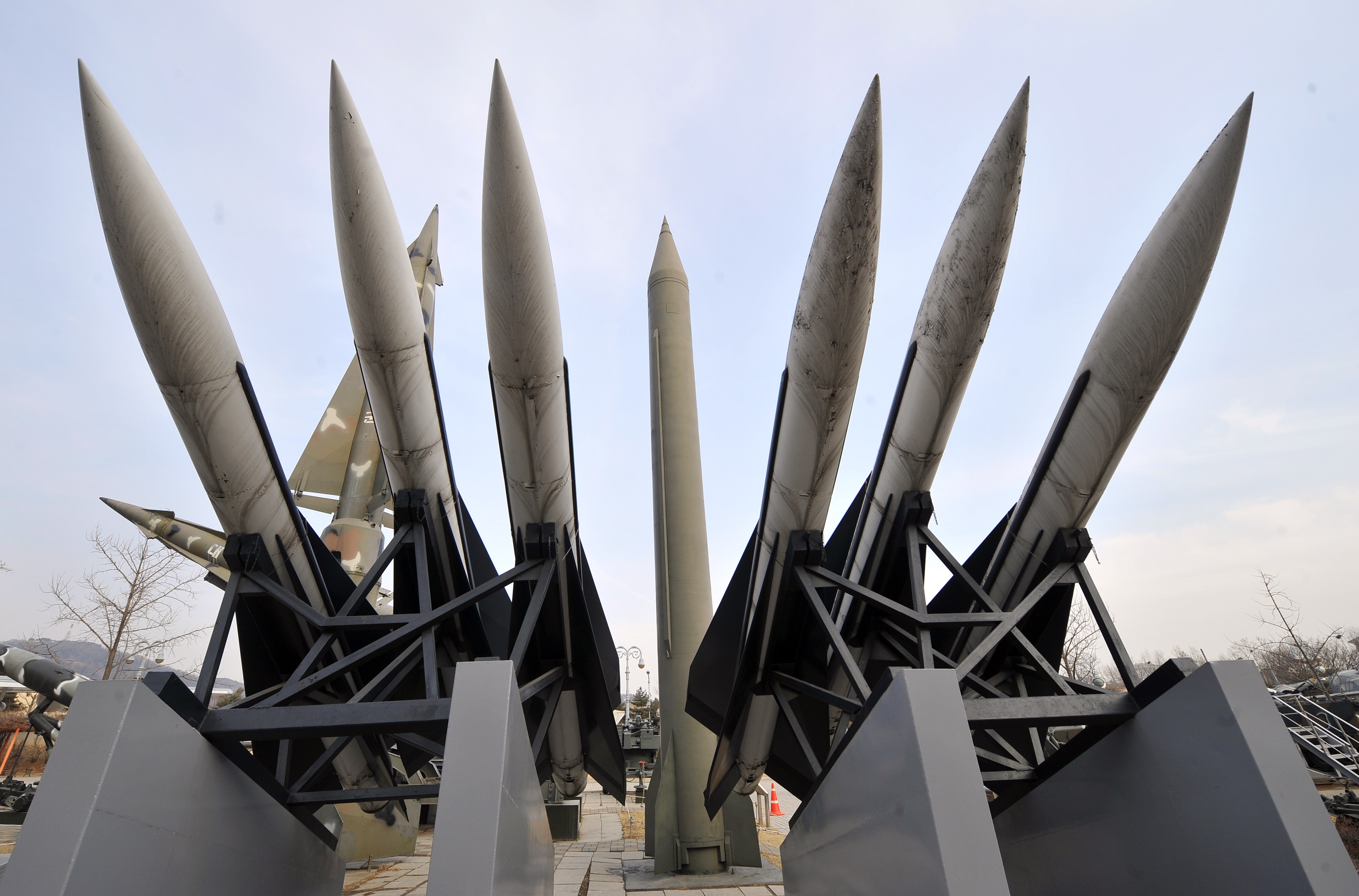
The U.S. now finds itself in a position of accepting the North Korean nuclear threat or doing something dramatic to remove it.
The U.S. has long held the position that a North Korean nuclear capability that threatens the U.S. homeland is unacceptable. Expert opinion is that North Korea either already has, or soon will have, precisely that capability. It is too late to prevent North Korea from obtaining nuclear weapons or an effective, long-range delivery platform. Thus, the threat that multiple democratic and republican presidential administrations have said they cannot accept is now real. Equivocation and failed policy approaches mean the Trump administration is now at a critical point of decision. The U.S. can either change its policy or do something dramatic to address the threat.
Fatalistic pundits hold that the U.S. must resign itself to dealing with a nuclear-armed North Korea, arguing it is best to continue economic and diplomatic sanctions, and more focused negotiation. But diplomacy has thus far failed and these are essentially the same approaches that resulted in the current crisis. Sanctions have been ineffective because of the regime’s ability to circumvent them with Chinese help. Aggressive sanctions did not work when the North Korean nuclear program was immature. We should not expect a different result now. If accepting a nuclear Democratic People’s Republic of Korea (DPRK) is unacceptable, then what are the options to deal with it?
The reality underpinning any future policy approach is that the DPRK will not willingly abandon its nuclear weapons. Any options to remove them by force are messy and controversial. Some experts contend that military force to destroy the DPRK nuclear capability represents “intolerable risks” and that war is an unrealistic option. General Joseph Dunford, the Chairman of the Joint Chiefs of Staff, suggested otherwise saying that military options must be considered. At first glance, any policy involving military options looks bad indeed.
In forming pragmatic, risk-informed policy options, security practitioners should not assume that Kim Jong-un will behave rationally or act predictably within international norms. He has demonstrated that he will take barbaric measures to ensure his power. Policymakers must consider that Kim Jong-un may unilaterally use his extensive military capabilities if he feels that his domestic hold on power is threatened. However, they must likewise consider whether in accepting a DPRK nuclear deterrent, that the world is trading a bad situation now for a future conflict under worse conditions. Conflict with North Korea portends a bad result; historically though, accommodating despots has proven worse: Adolph Hitler is a case in point.
Any decision to compel the North Korean regime by force, with or without a clear threat of an imminent attack from the DPRK, must consider the severe consequences of an escalating war with North Korea—one which could involve: the liberal use of chemical, biological, and nuclear weapons in South Korea and Japan; a protracted ground war; and China’s entry into the conflict on North Korea’s behalf. If the U.S. is unwilling to accept these risks, the Administration will be left to pursue the status quo of coercive diplomacy. It should expect that will embolden Kim Jong-un and impose additional risks on the U.S. and its regional allies.
If a North Korean intercontinental nuclear capability is truly unacceptable to the U.S., there are critical moral and ethical questions to contemplate. Any military action will very likely start a horrific conflict on the peninsula, which may include a direct confrontation between China and the United States. Key questions must be considered as to whether the loss of life and the chaos of a war to reestablish security will: (1) warrant the risk of nuclear war; (2) be morally acceptable and justifiable to prevent a greater loss of life later (should an increasingly desperate Kim Jong-un decide to use his nuclear capability on the U.S. or others’ territory); and (3) be worth the risk of conflict with China. Obviously, such a war has terrible implications for U.S. allies in East Asia. How do U.S. leaders weigh the trade-off between accepting possibly tens of millions of South Korean and Japanese civilian casualties today, to prevent the potential for similar loss of life in the United States in the future?
If the Trump administration resolves that military action is necessary to protect America, then policymakers must consider the benefits (and liabilities) of the available approaches. A lively debate surrounds the merits of preventive versus preemptive actions. While both represent first strike approaches, there are fundamental differences between them. Debate on this issue reflects a significant gap in understanding between academics who study security issues and those practitioners who must do something about them.
Much of the scholarly debate on a military response to North Korea centers on preemption and the use of force as a last resort. In the Just War tradition, many experts and scholars are inclined to adhere to approaches such as preemption, as it meets accepted moral, ethical, and legal justifications for the use of force as a last resort. Preemption has a specific definition that complies with certain accepted moral and legal interpretations prevalent in international relations circles. Noted scholar Colin Gray asserts: “Preemption is not controversial; legally, morally, or strategically. To preempt means to strike first (or attempt to do so) in the face of an attack that is either already underway or is very credibly imminent. The decision for war has been taken by the enemy.” Gray’s position is generally supported by international law as codified in Article 51 of the United Nations (UN) Charter. The legal justifications for any controversial preemptive actions taken will no doubt be adjudicated by the UN Security Council. Preemption is consistent with Article 51 and with a clear international consensus on national rights to self-defense.
Tolerating a North Korean nuclear threat requires accepting that Kim Jong-un is rational and predictable, and that he will act within international norms. His actions to ensure his power to date do not engender confidence.
While preemption appeals to moral and ethical sentiments, it is in practice a reactive approach, requiring anticipation of an imminent nuclear launch. Preemption loses its appeal if one is within range of such an attack. Reaction time is extremely short, as a missile attack can be detected only seconds prior to launch. Awaiting a UN resolution is not practical or realistic. Additionally, the U.S. and its allies possess a limited missile defense capability. Preemption features other problems. What constitutes an imminent attack? At what point in advance of a threatened attack does preemption become prevention? Fifty years after the Six Day War, people still debate whether Israel’s attacks were preemptive. More importantly, absent the certainty of an imminent threat, this policy approach allows North Korea to continue refining its intercontinental nuclear missile capability.
A preventive attack is another available option, though scholars may disagree over whether it constitutes the use of force as a last resort. For the sake of argument, a preventive use of force, while controversial, would address an unacceptably dangerous nuclear threat by an unpredictable regime, before its nuclear capability could be used against the U.S. or its territories. Gray’s definition of preventive war is also useful for what he describes as “a war of discretion…[t]he preventor…chooses to wage war, at least to launch military action, because of its fears for the future should it fail to act now.” This definition describes elements of what came to be known as the “Bush Doctrine,” to combat terror and weapons of mass destruction (WMD) threats, based on the 2002 National Security Strategy. This approach caused great debate among foreign policy experts concerned about a clear shift away from the traditional use of force as a last resort. Justifying the invasion of Iraq as a preventive measure (especially given the subsequent U.S. failure to verify its ‘WMD threat’ claims made prior to the war) further fueled criticism of the Bush Doctrine in terms of wars of choice versus those of necessity. However, distaste for preventive policy does not obviate its practicality. There is precedent for preventive action.
The 1981 Israeli attack on the Iraqi Tammuz nuclear plant effectively destroyed what the Israelis viewed as an imminent threat. In doing so, the Israeli government considered the risk of another Arab-Israeli war and reasoned that the threat of a nuclear Iraq warranted action. One can argue the moral, ethical, and legal concerns from a Just War perspective in this case, but one can also argue that the region was made safer as a result of Israel’s strike. Israel was certainly safer for it. There is broad international recognition of the compelling nature of North Korea’s threat and the U.S. should not dismiss the option of a preventive attack on it outright.
Those outside the Administration have the luxury of espousing the moral and ethical high ground on issues such as these, while bearing no responsibility for acting or failing to act on them. Security practitioners are, however, responsible for providing the President with risk-informed approaches, and for having considered the consequences of both action and inaction. The consequences of both are bad in this situation and the clock is ticking, with a relatively small timeframe to act within, before North Korea extends its nuclear threat to U.S. territories and the homeland. As such, it may be argued that the use of force as a last resort has come down to a decision between a reactive policy of preemption and one of resolute preventive action. While conflict is undesirable, a preventive attack, and the horrific conflict it could precipitate, may represent the ‘least bad’ of the available options to ensure U.S. security.
The U.S. now finds itself in a position of accepting the North Korean nuclear threat or doing something dramatic to remove it. Accepting a North Korean nuclear capability has negative implications for the growth of regional nuclear programs and the proliferation of technological know-how to Iran and others. One thing is certain: the U.S. must not consider a preventive attack on North Korea’s nuclear missile capability without strong guarantees of Chinese neutrality. The current Chinese position of “neutrality as long as the U.S. does not strike first” does not help to distinguish between a preemptive and a preventive policies, since both are first-strike approaches. North Korea is China’s problem, too. Regional instability threatens Chinese economic growth and international political influence. China’s recent support for increased UN sanctions on North Korea shows that the Chinese government is willing to crack down on its client. China may be convinced to remain neutral if given certain necessary assurances, and the U.S. can and should provide them. Among the most important considerations is an agreement among key actors to an end state which China, Russia, South Korea, and the U.S. can all accept.
Another war with North Korea has terrible implications. It would no doubt be militarily and economically painful; but, from a strictly U.S. security perspective, a nuclear threat to the U.S. homeland from an unpredictable despot makes a preventive war conceivable and possibly even necessary, no matter how awful. To this point, Senator Lindsey Graham recently voiced a succinct and pragmatic argument for preventive action, stating, “If there’s going to be a war to stop [Kim Jong Un (sic)], it will be over there. If thousands die, they’re going to die over there, they’re not going to die here.”
Continued strategic patience and further negotiation with North Korea mean the continued acceptance of failure and the continuation of a situation that the U.S. has long considered unacceptable. Tolerating a North Korean nuclear threat requires accepting that Kim Jong-un is rational and predictable, and that he will act within international norms. His actions to ensure his power to date do not engender confidence.
A distasteful alternative to the current policy is a preventive attack, which could mean resuming the unresolved war on the Korean Peninsula. The consequences of waiting for North Korea’s nuclear threat to mature are potentially far worse. The President now faces a difficult decision on whether the threat of a nuclear North Korea is truly unacceptable.
John Mauk is a retired Army Colonel and former member of the USAWC faculty currently pursuing a PhD through the School of Security Studies at King’s College London.
Photo: Replicas of a North Korean Scud-B missile (C-behind) and South Korean Hawk surface-to-air missiles (foreground) are seen at the Korean War Memorial in Seoul.
Photo Credit: JUNG YEON-JE/AFP/Getty Images




